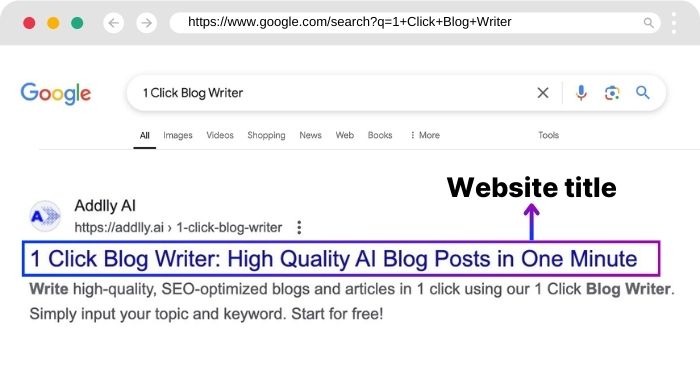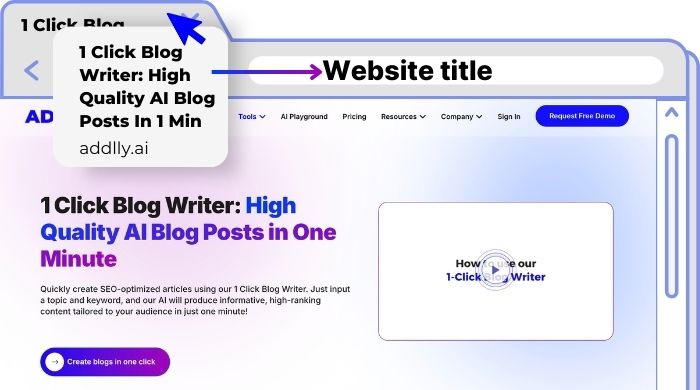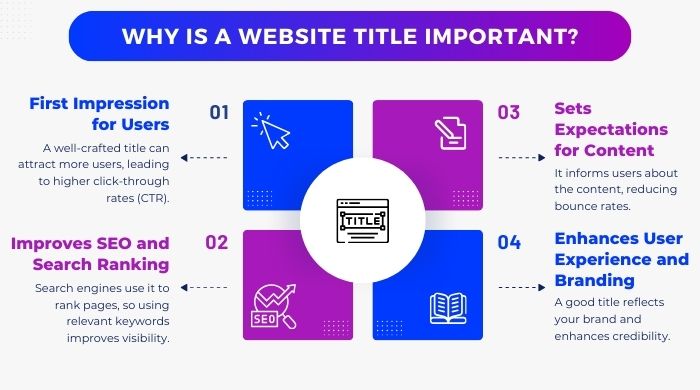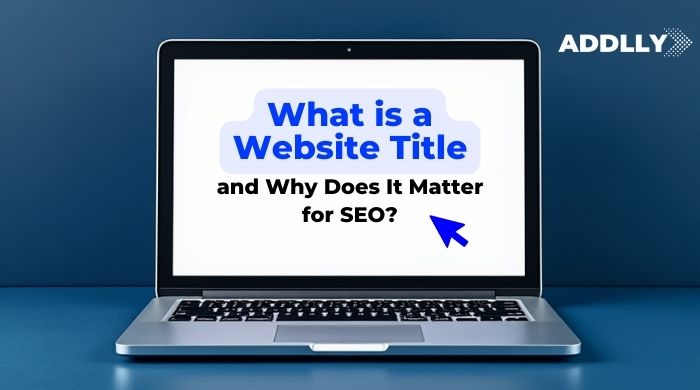What is a website title, and why does it matter so much in search engine optimization? Your website title (often called the title tag) is the first thing people see in the search engine results page. It appears as the clickable headline on search results and in the browser tab when a user opens your web page.
A good title helps search engines understand your content and encourages users to click. If written well, it can increase your click through rate and improve your search engine rankings.
In this blog, we’ll break down everything in a way that’s clear, helpful, and human.
What is a Title Tag?

A title tag is a short line of text that appears at the top of your web browser tab and in the search engine results when your web page shows up. It is an HTML element, coded using the <title> HTML tag, which is part of your page’s HTML code. This small line carries a lot of weight.
It helps search engines figure out what your web page’s content is about, and it tells readers what they can expect before they click. It should be short, direct, and include relevant keywords that match what people are searching for.
A well crafted website title guides both users and search engine bots to your page.
Where Does a Website Title Appear?

Your website title shows up in a few important places.
- First, it appears in the browser tab when someone opens your web page. This helps users keep track of which pages they’re viewing.
- Second, it’s shown as the clickable headline in the search engine results page. This is the part people click on when they see your site in search results.
- Third, your website title also displays when your link is shared on social media platforms.
In all these places, your title helps users decide if your web page is what they need. A clear and accurate title can help you stand out and get more clicks.
Why is a Website Title Important?

A website title is often the first thing people see before visiting your web page. It acts as your digital headline, setting expectations and helping your page stand out in SERP. A clear and focused title helps search engines understand the topic of your content, improving your chances of ranking higher.
It also increases your click through rate, especially when the title matches what people are searching for. Titles that accurately reflect your page content help build trust with readers.
A good title tag bridges the gap between users, search engines, and your content goals.
Btw, Check our guide on: How to Write a Listicle That Ranks
SEO Benefits of a Well-Crafted Title
A well crafted website title helps improve your search engine rankings by signaling to search engines what your web page is about. When your title incorporates relevant keywords and matches what users are searching for, it increases your chances of being shown in the search engine results page. This leads to more impressions, higher click through rates, and better visibility.
A good website title tag also reduces bounce rates because it aligns with the actual page content. When done right, your website title becomes a key driver of organic traffic, helping search engines and users find your content quickly and easily.
Impact of Website Title on User Experience and Trust
A strong website title does more than help with rankings, it builds trust with your visitors. When users see a title in the SERP that clearly matches the content of the page, they’re more likely to click and stay. If the title is misleading or confusing, they may leave right away. That hurts your click through rate and signals low relevance to search engines.
A clear title tag improves the overall experience by showing users they’re in the right place. It creates confidence, keeps expectations clear, and supports long-term engagement on your web page.
Role of Website Title in AI Search Engines like ChatGPT and Perplexity
AI search engines like ChatGPT and Perplexity scan web content differently from traditional search engines. They focus heavily on structure, clarity, and signals within your website title. Your article title tag is often used to summarize a page when AI tools present quick answers or generate link previews. If your title is too vague, it may get ignored or reworded.
Using relevant keywords in a clear and natural way helps AI engines better match your web page to search queries. These tools rely on clean HTML code, especially the <title> tag, to identify high-quality pages.
AI engines also consider how well the website title aligns with the actual page content. If it fits well, your page is more likely to appear in AI-generated responses and snippet panels. Simple, direct titles improve discoverability across both human and machine-based platforms.
Website Title vs Page Title vs H1 Tag
Which One Affects SEO Most?
Each element, the website title, page title, and H1 tag, affects SEO, but the website title (or title tag) has the most direct impact on organic rankings. It’s the one that appears in the SERP and helps search crawlers understand what your web page is about. The H1 tag supports SEO too, but it mainly helps users once they arrive.
Page title can sometimes refer to either the title tag or H1, depending on the platform. While all three should align, it’s the title tag that carries the highest weight in indexing and visibility.
Example:
Website Title (Page Title): How to Grow Tomatoes Indoors – Urban Garden Tips
H1 Tag: A Beginner’s Guide on How To Grow Tomatoes Indoors
Should They Be the Same or Different?
It’s best to keep your website title or page title and H1 tag closely aligned. There is no restriction on them being identical or not. The page tag should be optimized for search engines, using relevant keywords and staying within length limits. Your H1 can be more user-focused and conversational, while the page title (if used separately) may reflect internal labeling or navigation.
Keeping the core topic consistent avoids confusion for both readers and search crawlers. If they’re too different, it can signal a mismatch, which may reduce your click through rate or hurt your search engine rankings.
Example:
Website Title (Page Title): Top 10 Hiking Trails in California – Updated Guide
H1 Tag: Explore California’s Top 10 Best Hiking Trails
Have you gone through our guide on: How to Make ChatGPT Sound More Human
Where to Add or Edit Your Website Title (Technical Guide)
Adding Title in HTML Code
To add or edit a website title manually, go to the page’s HTML code and place the title inside the <title> tag within the <head> section. This method is common for static websites or custom-built pages. The content inside the <title> tag becomes the title tag shown in search results and on the browser tab. Make sure the title is brief, contains relevant keywords, and matches your content.
Example (HTML Title Tag):
<head>
<title>Easy Pasta Recipes for Busy Weeknights</title>
</head>
Editing Title via WordPress or SEO Plugins
If you’re using WordPress, you can set or update the existing website title through the post or page editor. Most themes use the page title as the default H1. For better control, use SEO plugins like Yoast SEO or Rank Math. These tools let you set a custom meta title (title tag) that’s different from the visible heading. This helps you optimize for search engines without changing how the web page looks to readers.
Example (SEO Plugin):
SEO Title: Best Hiking Trails in Colorado – 2025 Guide
How to Write a Perfect Website Title
1. Keep It Relevant To Your Topic
A website title should clearly match the main topic of your web page. When people search for something and your title reflects exactly what they need, your chances of getting clicks go up. Irrelevant or vague titles can lower your click through rate and confuse both users and search crawlers. A good title always aligns with the content of the page, helping users know what to expect before they click.
2. Ideal Length: Character & Pixel Guidelines
A strong title tag should be between 50 to 60 characters or under 580 pixels. Search engines may truncate longer titles, cutting off important words. Keep your message focused and front-load the most important information. Shorter, cleaner titles are easier to read and more likely to display correctly across devices. Stick to the essentials and avoid adding unnecessary filler words.
3. Keyword Placement
Place relevant keywords as early as possible in your website title. This tells search engines what the web page’s content is about right away. Keywords at the beginning also catch the user’s attention faster in the SERP. Avoid repeating or stuffing the same keyword multiple times, as this can hurt your search engine rankings. Be clear and specific.
4. Brand Name Mention
If you have a known brand, include it at the end of the title tag. This supports brand recognition while keeping the focus on the target keyword. Use a separator like a dash (–) or a pipe (|) to keep it readable. Only include your site title if it adds value or helps people recognize your brand.
5. Spelling and Capitalization
Always double-check for spelling mistakes. Misspelled words look unprofessional and confuse both users and search engine bots. Use title case. Capitalize only the first letter of major words, for better readability. Don’t use ALL CAPS or all lowercase unless it’s part of your brand style. Clean formatting makes your title look trustworthy and clear.
6. Target Audience
Think about who you want to reach. Your website title should speak directly to your target audience. Use words they understand and phrases they would search for. A title that sounds too generic or too technical might miss the mark. Aim to be simple, direct, and useful for the people you want to visit your site.
Check our guide on: Perplexity AI vs ChatGPT: Which AI Tool Is Better
Common Mistakes to Avoid When Creating a Website Title
1. Using Too Many or Irrelevant Keywords
Stuffing your website title with too many or irrelevant keywords makes it look unnatural and spammy. A poorly written meta title and meta description can lower your click through rate and hurt your keywords ranking. Search engines prefer titles that are focused and clearly related to the web page’s content. Keep your keyword use smart and minimal.
2. Duplicating Titles Across Multiple Pages
Using the same title tag on more than one page can confuse search engines and hurt your rankings. Each web page should have a unique title that describes its specific content. Duplicates make it harder for search engines to accurately reflect the value of each page.
3. Creating Titles That Don’t Match Page Content
If your website title promises one thing but the page content delivers something else, users will leave quickly. Misleading titles increases bounce rate and damages trust. Make sure your title gives a clear and honest preview of what’s on the page.
4. Writing for Bots Instead of Real Users
While it’s important to include keywords, your website title should still sound natural. Writing only for search crawlers makes titles awkward and hard to read. Always write for people first, then check that it also supports search engine optimization.
5. Keeping it Too Long or Too Short
Longer titles may get cut off in the SERP, while very short ones might not give enough information. Aim for 50–60 characters. This gives you enough room to include your target keyword and a useful description without being truncated.
Real Examples of Great Website Titles
- 10 Easy Pasta Recipes for Busy Weeknights – TastyBites
- Combines a number, keyword, and brand for clarity and appeal.
- How to Start a Blog in 2025 – Step-by-Step Guide
- Uses a target year and instructional format to increase relevance and freshness.
- Best Hiking Trails in Colorado | Adventure Map
- Includes location and keyword for local SEO while staying readable.
- Affordable Home Office Setup Ideas for Small Spaces
- Focused keyword with audience-specific problem-solving value.
- What is a Website Title? Understand Its SEO Impact
- Direct match to search intent, optimized for both users and search engines.
- Buy Organic Dog Food Online – Free 2-Day Shipping
- Clear product offering plus urgency to increase click through rate.
- Top 7 Fitness Apps to Try in 2025 (iOS & Android)
- Targeted list-style title with platform and year-based freshness.
Final Words
A well-written website title helps your web page stand out, supports better keywords ranking, and improves your CTR. Keep it clear, focused, and relevant to your page or article content. Avoid overusing keywords and always write for your target audience. Review your current title tags and update them using these best practices to boost visibility and attract more clicks from both search bots and users.
FAQs – Website Title
How Do You Find the Website Title?
You can see the website title at the top of your browser tab when you open a page. It’s also the blue clickable link in SERP. To find it in the code, look for the <title> html tag inside the page’s HTML code.
Can I Have Multiple Titles for a Page?
No, each web page should have only one website title or title tag in the website code. Having multiple titles can confuse search engines and hurt your SEO. Stick to one clear, focused title that matches your content and includes target keywords.
Does Changing My Website Title Affect SEO?
Yes, changing your website title can affect your search engine rankings. A better title can improve your click through rate and help search crawlers understand your content more clearly. Make sure the new title includes keywords and matches your content.


